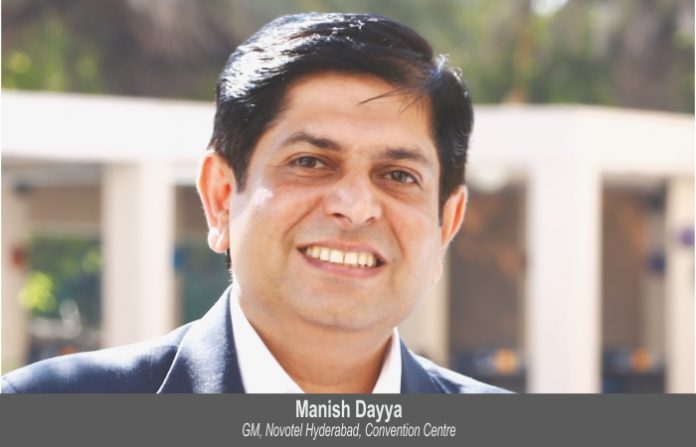COVID-19 has left its impact across varied industries and M!CE industry is no different. Reviving itself against hurdles, one lesson learnt well is to be sustainable in future.
Charmaine Fernz
The National Strategy and Roadmap for the M!CE industry in India states that the US has remained tops with 934 meetings out of a total of 13,254, as per ICCA Country and City Rankings 2019, while India with 158 meetings was at the 28th position as per the rankings. The document states that Indian M!CE has less than one per cent share in the estimated global M!CE business. This despite the natural, cultural advantages of India, and being one of the highest growing economies. The recall value of the Indian M!CE is considered low. While the industry has a substantial track to cover,
the way ahead needs to be more sustainable.
Sustainability in layman terms is a balancing act of People, Planet, and Profit. We all talk about climate change, but this fact is unrealised that climate change is also relevant in our everyday activities. Every individual needs to be more responsible towards the environment and infrastructural/economic development of planet earth, which if achieved can be beneficial in the long run.
Taking on this trend, the Indian M!CE industry in after intensity of the pandemic has lessened is looking at more sustainable events. Birju Gariba, Founder, ISKARA Events said, “Sustainable events and carbon neutral concepts have been doing rounds in our part of the world for almost a decade. However, it has picked up in the last couple of years before COVID-19. Many MNCs, following global practices, were the first ones to start smaller implementations towards the same, but the conversations have picked up more aggressively in the last five years. The pandemic was a natural promoter of sustainable events as a lot of events going digital or hybrid reduced carbon footprints.”
Manish Dayya, General Manager, Novotel Hyderabad Convention Centre and Hyderabad International Convention Centre said, “Sustainable events are managing events that take into consideration three aspects; environmental protection, social growth and economic progress. We are looking to endure balance at-risk approach so that these three perspectives are integrated into the planning of events at NHCC and HICC, into execution of the plans along with a commitment to review and make sure that any negative impact socially, economically and environmentally are managed and reduced to its minimal level, to be able to leave a better impact, to leave a better operation and make a difference to the managing of the events.”
Dayya goes on to positively assert that sustainable events will be the way forward for the M!CE Industry. “We are cognizant of the fact that earth has finite resources, we need to innovate to ensure they are intact for the future generations,” he added. Accor has taken major strides towards achieving this objective with its Planet 21 initiative. The programme focuses on sustainable development with concrete and quantitative objectives related to local sourcing, diversity, water, energy, waste management and much more.
Are we sustainable enough?
Just talking about sustainability is not enough, we need to start working towards or rather charting out a strategic plan and achievable goals. Being sustainable as mentioned before is an entire cycle and we are just at the beginning. The Indian hospitality industry is ensuring that small steps are being taken down the sustainable route. Following suit, Roseate Hotels has adopted some measures such as completely non-smoking with 100 per cent recycling of wastewater, no plastic straw usage, optimal energy usage, sustainable waste disposal and zero kitchen waste recycling. The brand also strongly promotes the conservation of flora with more than 2000 uncut trees across its Indian resorts.
From a convention centre point of view, Dayya says that both NHCC and HICC have taken all the necessary steps to achieve this objective. Some of the measures adopted are energy-efficient lighting, glass bottles for small to medium events to avoid the use of single-use plastic, water dispensers in larger events. NHC donates its unused soaps to the Soaps for Hope foundation for recycling the same and even the old linen is donated to Tender Heart NGO.
“The property at its restaurants and F&B at events offer healthy and balanced meals sourcing the products grown in our kitchen gardens, local products. We plan to reduce food wastage and prevent the use of single-use plastics. We also enter into partnerships with the local businesses and communities to promote sustainable ways to conduct events,” added Dayya.
Interestingly, known to be hosts to large events, during any of the events at NHC and HICC, if the minimum guarantees of guests are not met we have a tie-up with Robin Hood army wherein the excess food is distributed on a priority basis to the needy thus contributing to the society and promoting positive hospitality.
On a similar note, food waste is converted to compost which is then utilised for gardening purposes in Roseate Hotels and all its properties. The hotel group also takes pride in making their jams, marmalade and sauces from their farm produce.
The Growth Pangs
The pandemic has given the right impetus to smaller but more focussed events. The hybrid concept has helped many a chain to adopt more environment-friendly methods. The important point to note is the fact that the industry is much aware and conscious of its part in the entire cycle. As Gariba explained, “Being a fairly new company born during the pandemic, we at ISKRA encourage our clients to try and minimise wastages and make events carbon-emission efficient.”
Dayya stated that NHCC and HICC are known for handling sustainable events. “M!CE being our core focus, we have handled many national and international events across pharma, corporate, weddings, lifestyle, and other sectors,” he added. As part of the Planet 21 initiative, Accor has encouraged the organisers and their partners to follow sustainable practices. Events should be organised smartly and sensibly without leaving a minimal negative footprint. “We, at every opportunity in any of the international and national events with the consent of organisers, host pop-up shops by local entrepreneurs promoting, supporting providing a platform to showcase the local art and culture,” Dayya further added.
Sustainable events take effort and strategic planning. While it can be advantageous it also presents several challenges. Gariba with his long-standing experience in the M!CE sector explained that the advantages are simple, reduce the usage of paper encouraging digital formats and thereby largely reduce wastage. Alternatively, these steps do impact the costs and business environment since sustainable events incur extra costs and mar the business of certain units such as paper, travel, and venues. Dayya is of the view that sustainable events would help the businesses achieve their social objectives of preserving the environment, involving and benefiting the local communities. This would yield a positive reputation and improve the image of the organisation and the host as well.
The Right Direction
“We can confidently say now that every green step is the right step. However, the industry is witnessing unique trends which are shaping the industry. Green venues and hybrid events are largely the flavours of the new age,” asserted Dayya.
















